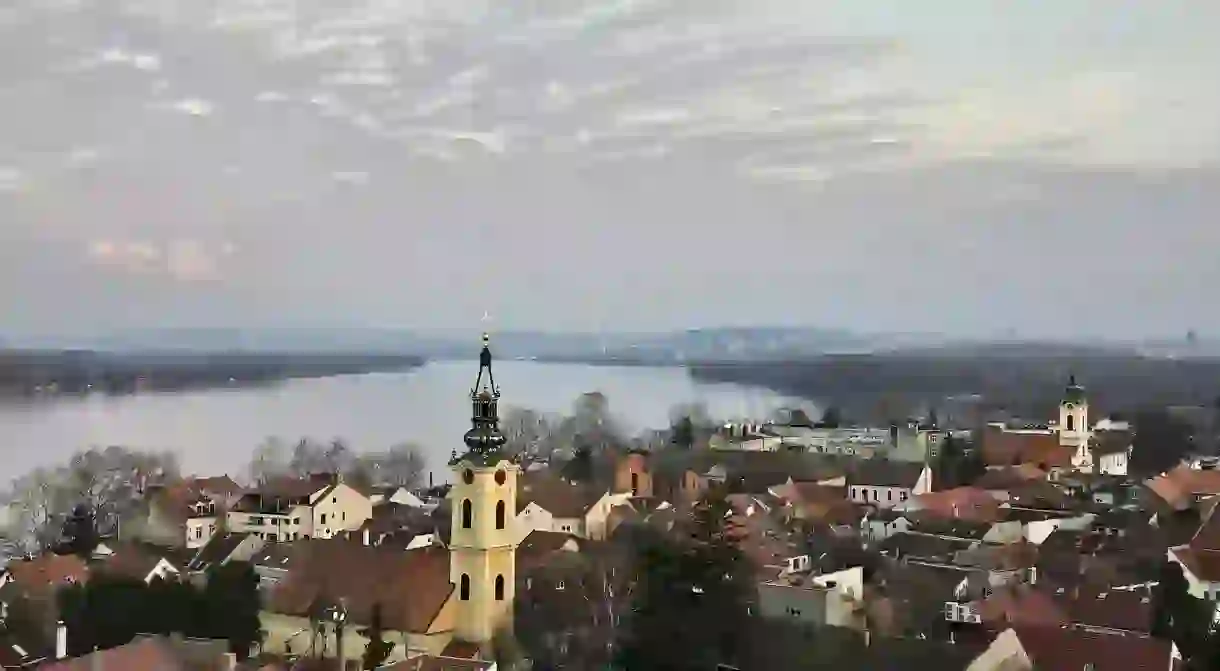Top 10 Things To See and Do in Zemun, Serbia

Zemun only became an official part of Belgrade in 1934, and it remains fiercely independent to this very day. This used to be a border town between the Ottoman and Austrian Empires, and there is plenty to see and do in Zemun; just don’t go referring to it as a part of the bigger city around locals.
Take in the view from Gardoš
Gardoš is undoubtedly the jewel in Zemun’s particularly sparkly crown. The town was built around this hill, and it acts as the perfect lookout over the Danube towards Kalemegdan and Belgrade’s old centre. The Kula Sibinjanin Janka (also known as Gardoš Tower and the Millennium Tower) is the most iconic spot, and heading inside and up to the viewpoint is definitely recommended. The tower was erected in 1896, to celebrate a millennium of Hungarian settlement in the region.
Explore the neighbourhoods of Belgrade with these tours.

Sample Serbia’s finest seafood
Zemun was built on the right bank of the mighty Danube, and it certainly makes the most of its riverside location. Boats clog up the shore here, and many house some of the finest restaurants in all of Serbia. If you’re a fan of seafood, this is the place to come. Fresh fish are regularly brought into Zemun’s busy markets, and the proof is in the pudding (or dishes, to be exact).
Stroll along the riverside
Speaking of Zemun and the Danube, taking a stroll along the riverside is always going to be a highly recommended thing to do. This is especially true throughout the summer, when the life and energy of the town moves from the centre to the coast. Every generation makes time for a saunter on the promenade, from old timers with dogs all the way down to little nippers with ice cream. There is also bumper cars, if more convincing was needed.
See the finest sights along the Danube with these river cruises.

Visit the Madlenianum
English speakers might make an assumption from hearing the name ‘Madlenianum’, but those assumptions will be largely incorrect. This is Zemun’s National Theatre, located on the main street that runs through the heart of the town. Unlike many other theatres throughout the country, the Madlenianum is a modern construction, and it was opened in January 1999. Operas, musicals, plays and the rest are put on here.
Zemun’s dark past
Zemun has experienced its fair share of hard times throughout the centuries. Yugoslavia’s Air Force Command Building was built here in 1935, and it is an impressive piece of Yugoslav architecture that is designed to look like a jet from the sky. The building was bombed during NATO’s 1999 campaign of aggression against Yugoslavia, and it is now largely abandoned.
Zemun’s main park looks like a lovely place to spend a summer’s afternoon, but it too carries a dark past. Well, ‘dark’ is probably an unfair word. Until the 19th century, this area acted as a quarantine for individuals moving between the Austrian and Ottoman Empires, and travellers and tradesman alike would spend weeks here before being cleared for further travel.
See Zenum on foot with these walking tours.
The nightlife never stops
The people of Zemun are often quick to point out their separation from Belgrade, but the town shares the same mentality as the big city when it comes to nightlife. Simply put, nights start late, and they end even later here. The riverside is full of popular clubs, while the town itself is home to countless pubs and bars with affable atmospheres and agreeable prices.
Book Belgrade nightlife tours here.
The curious history of the Synagogue
Europe’s Jewish population experienced a traumatic 20th century to say the least, but few synagogues have experienced as much upheaval and change as the one located in Zemun. More than 95% of Serbia’s Jewish population perished or fled during the war, and Zemun’s synagogue was subsequently sold to private owners under the watch of Milošević. It became a rock club, before being turned into the traditional Serbian restaurant that it is today.
It reverted back to a synagogue in 2018, however.
Strikes and turkeys at the bowling alley
Who doesn’t love a little bit of ten-pin bowling? The Serbs are strangely enamoured with the sport, and Zemun is home to one of the most popular alleys in the city. Many a student league has been set up, but there is usually plenty of space at Žabac. A bar and arcade games are on hand if you do have to wait, but it won’t be long before you’re celebrating strikes or lamenting your complete lack of hand–eye coordination.

Belgrade’s live music heart
There are plenty of places to catch live music in Belgrade, but none carry a more unabashedly punk rock vibe than Zemun’s Fest. The club opened its doors on the last day of 1991, and it has been putting on consistently excellent live music ever since.
A cemetery with multiple sides
Situated right next to the Millennium Tower on Gardoš Hill, Zemun’s cemetery is unique in Balkan terms. The region is full of cemeteries respecting the dead of the three major religions, yet Zemun’s graveyard brings the trio together. Orthodox Christians, Catholics, Muslims and Jews are buried throughout the grounds, and there are a number of solemn monuments included as well.
Book Belgrade tours and trips here.














